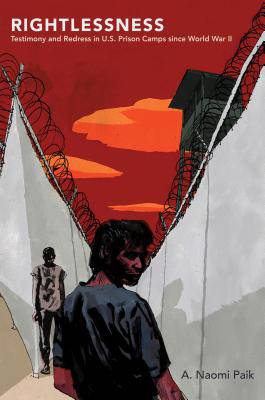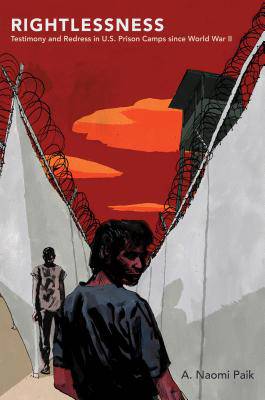
- Afhalen na 1 uur in een winkel met voorraad
- Gratis thuislevering in België vanaf € 30
- Ruim aanbod met 7 miljoen producten
- Afhalen na 1 uur in een winkel met voorraad
- Gratis thuislevering in België vanaf € 30
- Ruim aanbod met 7 miljoen producten
Zoeken
€ 49,95
+ 99 punten
Omschrijving
In this bold book, A. Naomi Paik grapples with the history of U.S. prison camps that have confined people outside the boundaries of legal and civil rights. Removed from the social and political communities that would guarantee fundamental legal protections, these detainees are effectively rightless, stripped of the right even to have rights. Rightless people thus expose an essential paradox: while the United States purports to champion inalienable rights at home and internationally, it has built its global power in part by creating a regime of imprisonment that places certain populations perceived as threats beyond rights. The United States' status as the guardian of rights coincides with, indeed depends on, its creation of rightlessness.
Yet rightless people are not silent. Drawing from an expansive testimonial archive of legal proceedings, truth commission records, poetry, and experimental video, Paik shows how rightless people use their imprisonment to protest U.S. state violence. She examines demands for redress by Japanese Americans interned during World War II, testimonies of HIV-positive Haitian refugees detained at Guantánamo in the early 1990s, and appeals by Guantánamo's enemy combatants from the War on Terror. In doing so, she reveals a powerful ongoing contest over the nature and meaning of the law, over civil liberties and global human rights, and over the power of the state in people's lives.
Yet rightless people are not silent. Drawing from an expansive testimonial archive of legal proceedings, truth commission records, poetry, and experimental video, Paik shows how rightless people use their imprisonment to protest U.S. state violence. She examines demands for redress by Japanese Americans interned during World War II, testimonies of HIV-positive Haitian refugees detained at Guantánamo in the early 1990s, and appeals by Guantánamo's enemy combatants from the War on Terror. In doing so, she reveals a powerful ongoing contest over the nature and meaning of the law, over civil liberties and global human rights, and over the power of the state in people's lives.
Specificaties
Betrokkenen
- Auteur(s):
- Uitgeverij:
Inhoud
- Aantal bladzijden:
- 332
- Taal:
- Engels
- Reeks:
Eigenschappen
- Productcode (EAN):
- 9781469626314
- Verschijningsdatum:
- 11/04/2016
- Uitvoering:
- Paperback
- Formaat:
- Trade paperback (VS)
- Afmetingen:
- 155 mm x 234 mm
- Gewicht:
- 498 g

Alleen bij Standaard Boekhandel
+ 99 punten op je klantenkaart van Standaard Boekhandel
Beoordelingen
We publiceren alleen reviews die voldoen aan de voorwaarden voor reviews. Bekijk onze voorwaarden voor reviews.











